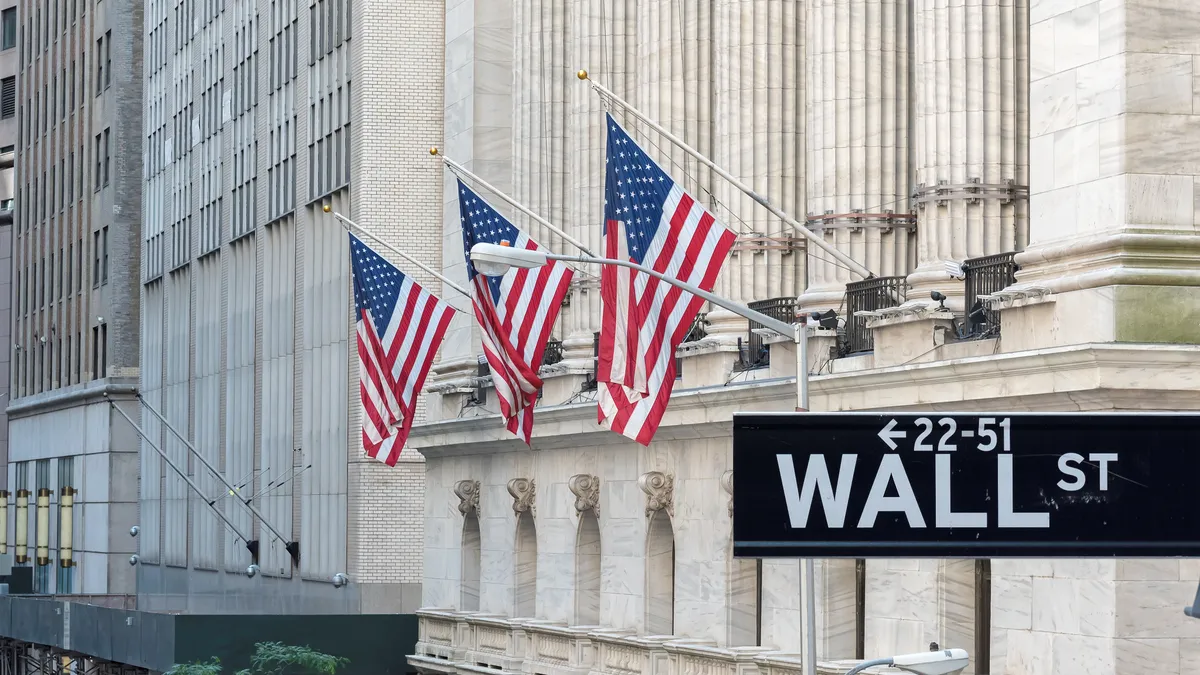Dive Brief:
- Year-end bonuses for equity sales and trading bankers will see an uptick of 15% to 25% – the highest any business area might get – driven by the spikes in trading volume that come with market volatility, according to a quarterly report published Thursday by Johnson Associates.
- Retail and commercial bankers’ incentives are predicted to drop by 5% to 10% because of lower lending volumes and higher credit provisions, according to the consultant.
- Equity underwriting, meanwhile, is predicted to plunge 10% to 20% as firms in the initial public offering market take a “wait and see” approach, the report found.
Dive Insight:
The grim forecast for Wall Street bonuses contrasts starkly with last year’s, when investment banking debt underwriters were set to see their year-end bonuses surge by 25% to 35%, according to Johnson Associates’ November report.
The overall uptick in year-end bonuses in the financial services industry marked the first wide-scale increase since 2021.
“We started 2025 with momentum and optimism, which has quickly changed,” Alan Johnson, managing director of Johnson Associates, told Bloomberg. “Now the expectation is pay will be down, moderately, off of a high level.”
Wall Street giants have been forced to assess the impact of President Donald Trump’s tariff plans on the financial sector. JPMorgan Chase CEO Jamie Dimon said last month he expected proposed tariffs to push inflation.
“Whether or not the menu of tariffs causes a recession remains in question, but it will slow down growth,” Dimon wrote in his annual letter to JPMorgan shareholders in early April.
The lack of predictability has spurred questions surrounding mergers and acquisitions, which were expected to surge under the Trump administration, with eased regulations and a vocal pro-growth stance.
An indirect link between tariffs and the surrounding volatility has “cooled” bank stocks, Christopher Olsen, managing partner and co-founder of investment-banking firm Olsen Palmer, said last month.
Year-end payments for bankers in the advisory market are expected to drop 5% to 10% as financial institutions pause their M&A activities, Johnson Associates predicted.
Bankers in traditional asset management will see a 5% to 10% decline in their bonuses while wealth management will see a drop between 2.5% to 7.5%, as investors seek to exit riskier businesses and companies step up technology efficiencies, the report said.
Debt underwriting, meanwhile, is set to see a 5% to 15% rise as debt issuance trends get higher, the consultant found.
By contrast, the average bonus paid to employees in New York City’s securities industry for 2024 reached $244, 700 – up 31.5% from last year, according to New York State Comptroller Thomas DiNapoli’s annual estimate.
“The record high bonus pool reflects Wall Street’s very strong performance in 2024,” DiNapoli said in a statement, adding the financial market’s strength is good news for New York’s economy and its fiscal position which relies on the tax revenue it generates.
“However, increasing uncertainty in the economy amid significant federal policy changes may dampen the outlook for parts of the securities industry in 2025,” he noted.











